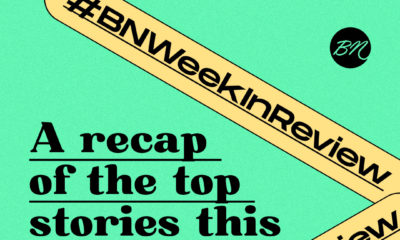Features
Chisom Winifred: This Thing Called Packaging
 This quote is familiar to almost every Nigerian ‘All na packaging’. How you present yourself is how you’ll be received and consequently treated.
This quote is familiar to almost every Nigerian ‘All na packaging’. How you present yourself is how you’ll be received and consequently treated.
A good friend of mine had what I thought was a funny experience. It happened at his bank and it prompted a very interesting conversation.
A contract he had been working on for a while finally clicked and he quickly rushed over to the bank to sort out some details. According to him:
I was in my faded jeans, polo and loafers. I walked in and the lady at the customer service unit gave me a once over and asked me to sit and wait to be attended to. I sat for thirty minutes. An older gentleman dressed smartly walked in, and she quickly attended to him. I let it slide; the man appeared to be in his early fifties, a matter of respect. She finished with the man and he left. When I noticed she had no intention of calling me, I walked over to her desk and asked, ‘Please can you attend to me now?’ All I got was, ‘Sir, I’ll call you when I have time, please sit.’ I sat for another fifteen minutes, nothing. My patience was on red.
My tone was no longer polite, ‘What is the meaning of this now? How long will it take you to attend to me?’ My raised voice was starting to draw attention. ‘Please sir, I told you, I’m a bit preoccupied now, I’ll attend to you soon,’ came her wary reply.
Her excuse made me even angrier. ‘You’re preoccupied?’ I yelled. ‘But you’ve attended to at least two people since I’ve been sitting over there, what kind of nonsense is this?’
The security guard approached and asked me to, please, lower my voice. It was too late for that; the lady’s attitude to the whole matter was just point blank annoying. The security guard asked me to sit. He promised he’d personally make sure I was attended to immediately. But I was already pissed; I stormed out of the banking hall.
The next day, I dressed smartly in my well tailored suit, with my briefcase, and went back to the bank. When I approached the same lady’s table, she didn’t even recognize me. She greeted me respectfully with a smile, ‘Good morning sir, please have a sit, how may I help you?’
No one recognized me! I was attended to and I exited the bank in record time. I was treated differently simply because I was dressed differently. Like it or not, in this country, packaging in necessary.
This got me thinking, class, perceived or real, affects everything. How we are treated.
This then begs the question: How does class shape an individual’s identity?
People of a higher class tend to socialise together, are identified by their wealth and assets. The working class are identified by their skills or white collar jobs. This identification creates a divide and these identities are linked to class and therefore one’s perceived place in the society.
How you would regard a celebrity is not how you’ll regard a waiter at a social function. Class is involved in a lot of life’s processes: from who you date, to the jobs you’re most likely to get, and, to a certain extent, the way you see yourself. Class differences makes different experiences and influences for everyone, which reflects in the way people are. Class affects you to the extent that it shapes who you are.
Margaret J. King, Director of The Centre for Cultural Studies and Analysis in Philadelphia, opined: Contrary to popular opinion, class has little to do with wealth; class is a mindset that rests on the platform of education, decision-making, upward mobility, faith in the future and in the power of self-determination. The main difference between poverty and middle class and between middle class and the wealthy is the belief in oneself. It’s not about the money, money is the outcome. It’s the mindset that sees people as centres of the wealth and stability in themselves, with careers or professions rather than jobs, opportunities for advancement at work and in the social market place.
There is then this argument, should one ‘package’ and pretend to be what they’re not to get into certain places in the society? ‘Fake it till you make it?’ See yourself the way you want to be and you’ll gradually grow to become that person?
What adverse effect does ‘packaging’ have? Does it make us fake people, claiming to be what we’re not?
Photo Credit:Dreamstime

























